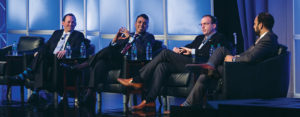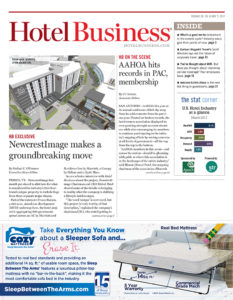ATLANTA—The state of the lodging industry was top of mind here at the recent Hunter Hotel Conference, where the mood remained positive about the profitability horizon for at least the next 12 months.
Tackling what some of the challenges and advantages of the current environment hold for the months ahead was a panel of leading executives who brought their opinions to bear on a variety of subjects.
Moderated by Teague Hunter, president of Hunter Hotel Advisors, the panel consisted of Mit Shah, CEO/managing principal, Noble Investment Group; Tyler Morse, CEO/managing partner, MCR Development LLC; and Suril Shah, managing director, Starwood Capital Group.
To set the stage, the executives first took a look back at 2016, which Morse said “was kind of a wasteland from a transactions standpoint,” estimating volume down about 50% from the previous year. “I think declining RevPAR was a factor in that, and frankly, there was just a huge bid/ask spread. Sellers still thought it was 2015 and buyers were watching Wall Street announce 1-2% RevPAR growth, and the line was never crossed,” he added.
Starwood’s Shah agreed 2016 “got started off very poorly. In December 2015 and into January you saw the REITs crumble and I think that put a whole chill on everyone’s thinking, [e.g.] ‘We’re seven years into the cycle. Is this kind of the time people are forecasting actually negative RevPAR growth?’” he said.
Hunter noted industry stats showed transaction volume off some 40% in 2016. “I like to blame that,” he said.
With some $2 billion of assets under management, Noble Investment’s Shah indicated it’s difficult to see what’s on the horizon “when there’s not clarity about what’s going on in the market,” something he felt there’s even less of currently.
“In the public markets, if you look at all the RevPAR forecasts from the public companies who are forced to forecast, it’s all deemed as very, very conservative. Of course it is because no one wants to end up with the same situation as they went through last year, where they’re getting dinged quarter over quarter,” he observed.

LEFT TO RIGHT: Teague Hunter, president of Hunter Hotel Advisors; Mit Shah, CEO/managing principal, Noble Investment Group; Tyler Morse, CEO/managing partner, MCR Development LLC; and Suril Shah, managing director, Starwood Capital Group, all discussed the profitability horizon for the industry for the next 12 months.
With about $10 billion in hotel assets in the United States, Starwood Capital Group’s underwriting “looks different today than before,” said its managing director, suggesting, “There has to be a very clear story” to hedge against a recession. “You can ask: ‘When’s a recession coming? When’s the cycle going to end?’ If you don’t know, you can say it’s coming in two years, three years—whatever your number is. But you can’t invest that way. You can’t just assume a recession is going to come in two years because then you wouldn’t buy anything; you’d wait two years. You can’t run a business that way.”
Morse, whose MCR development has a roughly $2-billion portfolio of 90 hotels in 23 states, focused on the positives. “The macro trend [around being]recession proof is more people are traveling every day in 2017 than they have in years. The macro statistics support that in terms of air travel and just pre-conceived travel. I ascribe most of that to the discount carriers, and each year, another ultra-low-cost carrier pops up. There are all those carriers that are flying people around for 39 bucks. Granted, you get no services and your knees are on your chin; it’s a horrible experience. But for 39 bucks, what do you want? You can go to Florida and stay at a SpringHill Suites for 89 bucks and that’s a terrific vacation. I think the select-service hotel, which the three of us participate in quite heavily, is the way to play the recession,” he said. “If a recession does come in two to three years, our cash flows are going to be more stable than the cash flow of [a much larger room count]building.”
Noble’s Shah indicated from a risk-adjusted standpoint, “You could stand a 10% decrease in RevPAR in select-service and still be at a better yield relative to all the other property types.”
Starwood’s Shah noted his firm showed the value of a select-service portfolio with the recent move by China Life Insurance Co. Ltd., China’s largest life insurance company, which invested with SCG in approximately $2 billion of select-service hotels in the United States.
(China Life is the lead investor for the portfolio in tandem with a group of sovereign wealth funds and other investors. The portfolio, with locations in 40 states, has 280 branded select-service hotels.)
“In speaking to our Asian partners, they found what a lot of us have known for a long time: If you want stable cash flow in the United States…you can certainly get a lot of safety buying the ‘jewels’ or ‘trophies’ in New York City, but if you want stable cash flow you get into select-service hotels… It’s amazing to see how select-service has grown over the past decade,” he said, adding Starwood Capital Group stayed on as the asset manager.
Noble’s Shah maintained in the current environment performance remains a market-by-market exercise. “There’s markets that are showing double-digit RevPAR increases and markets that are showing double-digit decreases and I’m not talking about the top five MSA… Competitive wage inflation is real… We’re still very, very positive on overall RevPAR for the industry for this year,” he said, noting construction costs, CMBS loans coming due and other factors will help color the industry picture in the months ahead. HB

